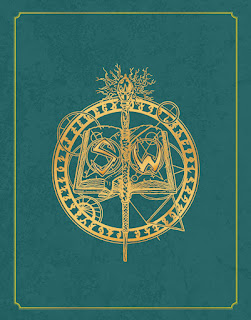I am starting a few new GURPS campaigns in 2025, but the end half of 2024 has been tough. Right now, I am cleaning out 40 years of games and putting things in storage. I will unbox a game, put it on a shelf, see if it interests me, and then box it up and realize I don't have time for it or I have better.
Some never go away and never get boxed up. GURPS is one of them.
OSRIC and first-edition dungeon gaming are another. The entire D&D concept has been warped into an unrecognizable state today. This isn't even the same game I remember. When I go back to basics, this is where my inspiration and truth lie.
There is one fork of modern D&D that I like. It started in D&D 4th Edition for us, with the "tabletop dungeon board game" playing a central role in the game. This fork started in D&D 3.5E, went to D&D 4E, and today, it lives on in Pathfinder 2E. The whole "figures, dungeon tiles, and d20 gaming" only exists in that form here, and to be honest, the genre is very close to GURPS' hex-based adventuring.
Pathfinder 2E is a sister game to GURPS. It has pre-chewed character options and adopts polyhedral dice as randomizers. If you want it "on the table" and like that tactical hit, play GURPS or Pathfinder 2E and forget everything else exists.
Everything I like about gaming is lost when you go to the rules-light or theater of the mind games.
Also, a lot has been "done for me" in a game like Pathfinder 2E, and I can spend weeks converting it to GURPS with time I don't have or just open this and play for a while, exploring what the designers did with the game. They have good ideas and fresh takes here, improving the characters I build in GURPS since I have external inputs and things to reflect upon.
GURPS, for me, with the fantasy genre? I am still reflecting on what I like about it. There is a "thing" there, a place I want to be; I just haven't found it yet. I don't want to simulate kitchen-sink fantasy, nor do I want to convert endless spells and monster lists. GURPS can do much more than emulate; it can create something new. If I play GURPS in the fantasy genre, I want magic to be strange and mysterious, something that reflects the person. I want monsters to be myth-like representations of human weaknesses and sins. GURPS tells those stories much better than it does, emulating other games.
At least for me.
I am also playing the excellent American Truck Simulator (ATS) on my PC over the holidays and reflecting on how stupid the "Traveller cargo model" is. Science fiction RPGs have been stuck with this 16th-century "the captain buys the cargo and sells it somewhere else" model of merchant campaigning, and compared to ATS, it makes the entire "space game cargo model" seem stupid.
In ATS, you aren't randomly buying air conditioner units in one town and taking them to another, praying somebody wants them. No, a company is hiring you to haul them and get them from place A to place B intact because they need these units there, and they need them there now. You can see why when you drop these cargoes off at job sites, factories, food processing plants, truck dealerships, and every other location in ATS.
You are a part of a larger economy.
And all the while, you are dealing with the little things that could mess this up: fuel, sleep, idiot drivers, produce inspection stations, weigh stations, local laws, what lanes trucks can drive in, and how fast, hazardous cargoes and getting certified to haul them, trailer types, jobs that are just not available, or there are too many good ones, and you need to pick and choose your destination, repairs. You learn the terrain and the skills required to get across it safely. You know all the things truck stops and garages do and need to keep this truck running well.
Even using mirrors, lights, and turn signals is essential knowledge.
And you get to run a company with drivers, and you need to manage garages and trucks.
If you are into space gaming, and your merchant campaigns fall flat because they fall into the "roll cargo, fly somewhere, and sell," play this game to the point where you buy a truck and learn the game. Learn how to back up. Learn how to repair your vehicle. Learn when to gas up and rest. Obey the rules for weight stations and produce inspection stations. Learn the laws and read the signs. Learn how to navigate.
You could "work" for just a company in this game, take their loads, and learn how it feels to be a company hauler. In a space game, if a company is terraforming a world, that is an almost insane amount of cargo, machinery, construction equipment, habitation pods, and other "stuff" that isn't made locally in that target world. And terraforming operations can last hundreds of years, and the "flavor" of the cargo will change over time.
You could just play that as a part of a single campaign and get to know the drop-off points, who lives there, the local space militia and law enforcement, what problems they have, what they need, the company managers on-site, and you will build this world in your mind as you haul there.
Many of today's science fiction games have this "hop around" mentality where "new backdrops are fun!" While ATS has "varied backdrops" in the places you go, it focuses on more than one part of that experience, changing how I think about science fiction gaming.
Just replace the trucks with starships, and you have an excellent science-fiction game.
GURPS would do this type of game exceptionally well, and you don't need Star Trek or Star Wars to support it. Fantasy, for me, is the same way. I don't want D&D to prop up my GURPS Fantasy game. I want to find something GURPS can simulate well, without emulating anything, and focus the experience on that.
GURPS also has "fine-grained" skills, and I will need a crew to cover what I don't know but need. GURPS Ultra-Lite can fill those NPCs just fine, and I don't need to spend days creating a crew. Are we hauling hazardous materials? Let's hire a hazmat specialist for this trip only. Do we know any, and are they on-planet? Would hiring them as a permanent position make sense, since we haul these high-paying loads often?
Let's do the math.
For me, this is where GURPS shines. I get a world model and concept built in my head, like, "What if ATS was a space trucker game?" GURPS makes that dream come alive. However, the idea for the game comes from the outside and doesn't originate in emulating other games. The entire ATS concept "in space" is mind-expanding and strong, especially diving into the level of detail this game forces you to think about.
To me, the kitchen sink fantasy is like the Traveller cargo-hauling model. We assume "it works there" so "we can port it in" without looking elsewhere and asking, "Can't we do better?" ATS has forever changed my mind on merchant campaigns and cargo hauling. Better models exist that can tell better stories. Recycling other games is not how we find them.
I want to find that in the fantasy genre, which must come from outside of "fantasy roleplaying."















